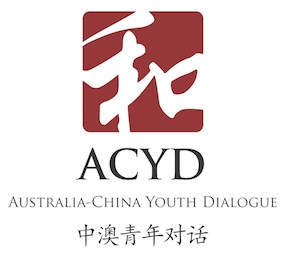Interview by Anna Groot, Advance Asia Director
How did the Australia-China Youth Dialogue come about and what is the objective of the organisation?
There was an article in The Age in late 2009 authored by Stephen Fitzgerald, Australia’s first ambassador to the People’s Republic of China, highlighting the lack of institutionalised track one and two dialogue between Australia and China, our largest trading partner. He observed that Australia had a series of such institutions between New Zealand, the United States, and even Israel, yet there was a blank slate, and real need for, such architecture between Australia and China across the spectrum of the bilateral relationship.
I read the article with interest and decided to take action. I met with a motivated group of (then) undergraduates at the ANU over coffee one afternoon and decided to make a pitch to the Australia China Council at the Department of Foreign Affairs and Trade. To our surprise, we were successful. With DFAT’s support and institutional backing, it made it a lot easier for the ACYD to fundraise the capital we needed to kick-start our first dialogue that was held in Beijing then Shanghai in 2010.
The objective of the organisation is to identify future leaders in Australia-China affairs, network them with each other, then via the global ACYD alumni community, build out an inter-disciplinary community of future business, political, academic and artistic leaders who will, at some stage (if not already), rise to positions of authority and thought leadership across the Australia-China dynamic. Developing a high-powered network of Australia-China savvy leaders can only be to the net benefit of Australia-China relations. Moreover, such a network will only serve to make Australia more competitive against other peer middle power countries seeking access and influence in China.
Aside from your involvement with ACYD, do you see any particular opportunities Australia should be picking up on in terms of deepening its engagement with Asia?
I think there is scope to provide a lot more pastoral care for full-fee paying Asian students studying in Australia, in addition to making it easier for them to gain working visas to intern or remain in Australia after they’ve completed their studies. International students who have felt cared for, as opposed to exploited and commoditized, are more likely to, over time, act as roaming brand ambassadors for Australia which would create a range of win-win opportunities for Australian national interests.
What are the most important benefits of cross-cultural networks?
The opportunity to see other viewpoints without sensationalised media distortion which tends to grip issues that are multi-faceted and difficult to distil in a brief news grab, is an important benefit of cross-cultural networks. Moreover, cross-cultural networks allow first-mover informational advantages: often there is a lag when events or trends in places such as China are picked up by Western media. Having friends from China or of Chinese heritage that are active China watchers allows me to not only empathise with other perspectives, but also be ahead of the curve with respect to my understanding of events and trends in the region.
Why did you initially decide to move to Hong Kong?
To be close to China and be at the financial epicentre of Asia’s economic rise. In addition, as Hong Kong is a mature, sophisticated economy, the scope for more rigid and comprehensive training in a developed market with established law firms and clients that have been here for decades was another reason I wanted to start my career in Hong Kong.
What did you most enjoy about living here?
The entrepreneurial spirit of living in Hong Kong and the convenience of travel to so many cultures and landscapes within a few hours flight. The diversity of cultures, both Asian and Western in addition to the beautiful nature reserves and beaches around HK for outdoor fitness are other terrific aspects of living in Hong Kong.
I also enjoy the opportunity to look at the world through new perspectives; gaining an appreciation of different norms, traditions, and ways of doing business is incredibly enriching. If you studied Chinese, like I did, the opportunity to use Chinese in a day-to-day work context, both within and outside the office, adds an extra dimension of challenge and reward to my work.
Which formal networks do you belong to?
I am a member of the AustCham Young Executives Committee in Hong Kong, the Asia Society, the Young China Watchers, the American Australian Association, the Royal Geographical Society in Hong Kong, the Harvard Club of Hong Kong and the ANU Alumni Association.
Do you have a life motto?
A passage from Confucius’ The Analects provides a good roadmap to life of continuous learning:
At 15, I set my heart on learning;
At 30, I took my stand;
At 40, I no longer had doubts;
At 50, I knew the will of the heavens;
At 60, my ear was attuned;
At 70, I follow all the desires of my heart without breaking any rule.
What drew you to Advance?
The fact that Advance is the only organisation seeking to connect Australia’s global diaspora with each other and our links with Australia is a worthwhile mission. No other organisation has this mandate and so, as a member of Australia’s global diaspora, it made sense to get involved with Advance.
What advice would you give other young Australians looking to move to Asia?
Resist the temptation to spend time just with other Australians when abroad. Do your best to break out of a foreign ghetto existence.
To get the most out of living in Asia, you need a lot of energy and an open mind: there’s so much going on professionally and socially, you need to be active and alert to take advantage of, and participate fully in, the extraordinary array of business deals, networking events and activities taking place all over Hong Kong every day of the week.
You require patience and an open mind to empathise with other cultures and viewpoints, in both the social and business contexts, to earn trust and build respect.
You should also have an enduring curiosity in the region around you – in Asia, the learning curve never stops; you’ve got to be interested in the socio-political-cultural environments that you’re working and living in, to offer informed, sophisticated perspectives.
Retrieved from : http://advance.org/articles/the-benefits-of-identifying-with-multiple-cultures/













